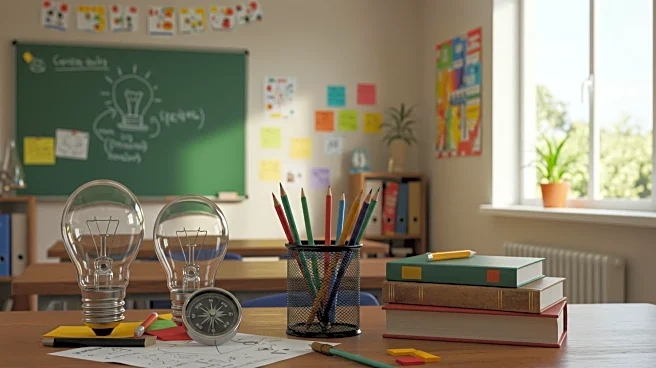What's Happening?
An educator has designed a life-skills class aimed at bridging the gap between traditional education and real-world applicability. The initiative was sparked by observations of student disengagement during the pandemic and a Gallup poll indicating that less than half of students find their schoolwork challenging. The course, named 'Your Life, Your World,' was launched in the 2024-25 school year after nearly two years of development. It focuses on practical skills such as budgeting, stress management, conflict resolution, and career planning. The curriculum is based on John Dewey’s principles of experiential learning and Waldorf methods, encouraging students to take ownership of their learning. The class has received positive feedback from students and parents, who appreciate its relevance to real-life challenges.
Why It's Important?
The introduction of life-skills classes in high schools addresses a critical need for education that prepares students for real-world challenges. By focusing on practical skills, the course aims to improve student self-esteem and reduce anxiety, fostering a more engaged and prepared student body. This approach could lead to a shift in educational priorities, emphasizing the importance of equipping students with skills that are directly applicable to their future careers and personal lives. Schools adopting similar models may see increased student motivation and participation, potentially leading to better educational outcomes and more well-rounded graduates.
What's Next?
The success of the life-skills class may inspire other educators and schools to adopt similar programs, potentially leading to widespread changes in high school curricula. As more schools recognize the importance of practical education, there could be an increase in courses that focus on real-world skills. This shift may also prompt educational policymakers to consider integrating life-skills education into standard curricula, ensuring that all students have access to these valuable learning opportunities. Additionally, the educator has expressed willingness to share the course model with others, potentially facilitating broader adoption.
Beyond the Headlines
The development of life-skills classes highlights a growing recognition of the need for education systems to evolve in response to societal changes. As students face increasingly complex challenges in their personal and professional lives, schools must adapt to provide relevant and meaningful education. This trend may also influence the way educators approach teaching, encouraging more personalized and student-centered learning experiences. Furthermore, the integration of life-skills education could have long-term benefits for communities, as students become more equipped to contribute positively to society.









